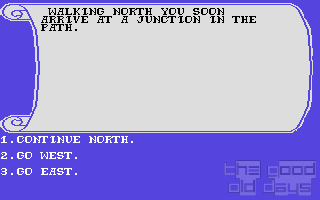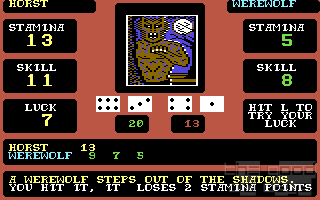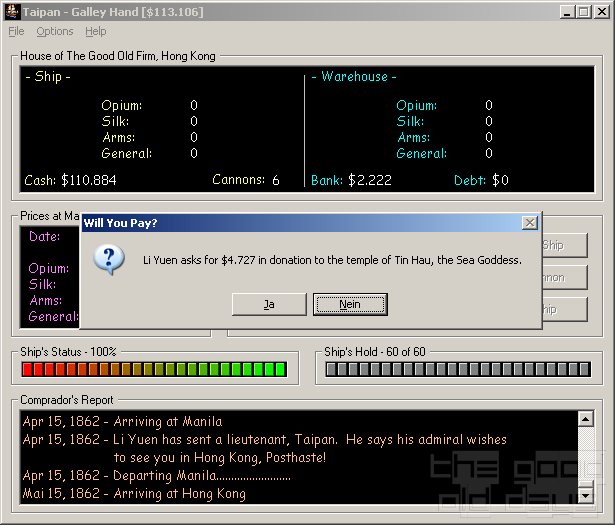The second and the third book of the Fighting Fantasy line of single-player roleplaying games received almost literal translations into the computer games medium. Released in short succession, the general remarks made on the game engine in the review of The Citadel of Chaos equally apply to The Forest of Doom.
As for the contents of the adventure itself, the plot and the specific mechanics have also been covered in good detail in LostInSpace's review of the underlying book. Plot and mechanics which may not be equally appreciated by everyone. So I'm going to use this opportunity of reviewing the computer game conversion to mainly give a second opinion about this forest and its inhabitants.

You see, after collaborating on the first book of the line, The Warlock of Firetop Mountain, the two Games Workshop founders, Steve Jackson and Ian Livingstone, split to each write their own book next. Jackson did The Citadel of Chaos, which – although not successful on all accounts – tried to tell a somewhat coherent story and experimented to enhance the core game mechanics at least to a small degree. Livingstone, on the other hand, did Forest; a book which today can probably stand as the most representative of all early Fighting Fantasy adventures – because it is so average in all respects.
The player's goal: finding scattered artifacts on the sprawling map. Check. The player is forced to take long-term decisions (which equipment to take along) right at the beginning of the adventure without the foundation to make an informed decision. Check. (Although the impact of bad decisions is somewhat limited admittedly.) The adventure consists of countless paragraphs giving a brief location description and then simply asking the player for a meaningless, uninformed “go left or go right” decision. Check. The forest hosts a wild mixture of creatures from vastly different mythologies, encounters which feel totally random and at times out of place. Check.
Apologists never fail to point out this is one of the few adventures of the line which can actually be won with any character, even if dice rolls were sub-standard. While strictly speaking true, as the optimal path through the game contains a minimum of hostile encounters and traps, what are the chances to find this path intuitively? Exactly, very close to zero. Straying just millimetres away from this, even strong characters will be punished severely and failure by bad luck is likely.

The one innovation this adventure attempts is actually a noteworthy one. Maybe the main question in these is always why the protagonist is not allowed to backtrack. Sure, sometimes there are good reasons, such as a cave-in preventing to go back where you came from, but how many ways are there to explain it like that? In this case, arriving at the dwarven town without the parts of the mystical hammer, why not turn back and continue searching the forest?
Indeed, there is an honorable attempt to address this, though in a most cumbersome way. The game simply offers the player to return to the starting point and retry from there. Even if what you seek may be much closer to another entry point into the forest. What's worse, though, is that absolutely nothing in the game will reflect this “second try” status. Everybody you meet will behave as if they have never met you. Monsters you have already killed will return. You will find the same items again. This is awkward. Why not just start over with a new character in that case? Player knowledge is retained anyway.
So that's really the issue at hand here. The computer conversion has some drawbacks, such as the known issues of text display and reduced graphical quality, but at least this game appears well tested; no major bugs have been encountered. Nevertheless, being such a close conversion, it inherits all the defects and disadvantages of the book. In my view, this is a blandly written tale which is all over the place, with no apparent theme and fairly bad execution as far as player choices are concerned. If left-or-right decision are your thing and you consider the ever-changing setting and random encounters a plus on variety, go ahead and try it out.


Comments (1) [Post comment]